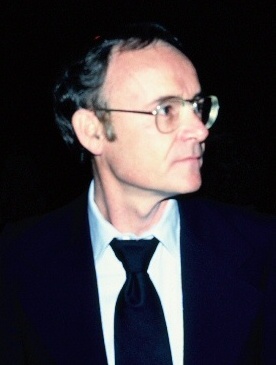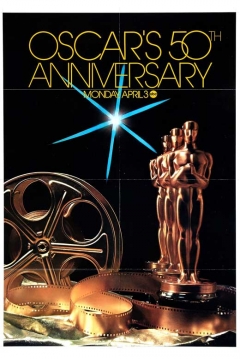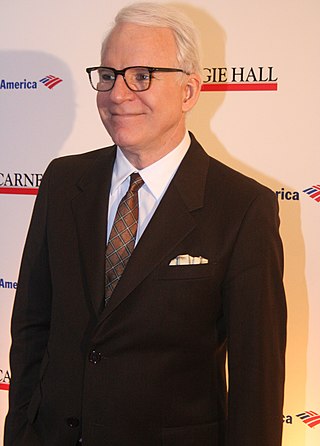
Burton Stephen Lancaster was an American actor and film producer. Initially known for playing tough guys with a tender heart, he went on to achieve success with more complex and challenging roles over a 45-year career in films and television series. He was a four-time nominee for the Academy Award for Best Actor, and he also won two BAFTA Awards and one Golden Globe Award for Best Lead Actor. The American Film Institute ranks Lancaster as #19 of the greatest male stars of classic Hollywood cinema.

Stephen Glenn Martin is an American comedian, actor, writer, producer, and musician. Known for his work in comedy films, television, and recording, he has received many accolades, including five Grammy Awards, a Primetime Emmy Award and an Honorary Academy Award, in addition to nominations for two Tony Awards. He also received the Mark Twain Prize for American Humor in 2005, the Kennedy Center Honors in 2007, and an AFI Life Achievement Award in 2015. In 2004, Comedy Central ranked Martin at sixth place in a list of the 100 greatest stand-up comics. The Guardian named him one of the best actors never to have received an Academy Award nomination.

William Gale Vinton was an American animator and filmmaker. Vinton was best known for his Claymation work, alongside creating iconic characters such as The California Raisins. He won an Oscar for his work alongside several Emmy Awards and Clio Awards for his studio's work.

The Sherman Brothers were an American songwriting duo that specialized in musical films, made up of brothers Robert B. Sherman and Richard M. Sherman. Together they received various accolades including two Academy Awards and three Grammy Awards. They received nominations for a Laurence Olivier Award, a BAFTA Award, and five Golden Globe Awards. In 1976, they received a star on the Hollywood Walk of Fame, and the National Medal of the Arts in 2008.

Buck Henry was an American actor, screenwriter, and director. Henry's contributions to film included his work as a co-writer for Mike Nichols's The Graduate (1967) for which he received a nomination for the Academy Award for Best Adapted Screenplay. He also appeared in Nichols' Catch-22 (1970), Herbert Ross' The Owl and the Pussycat (1970), and Peter Bogdanovich's What's Up, Doc? (1972). In 1978, he co-directed Heaven Can Wait (1978) with Warren Beatty receiving a nomination for the Academy Award for Best Director. He later appeared in Albert Brooks' Defending Your Life (1991), and the Robert Altman films The Player (1992) and Short Cuts (1993).

Frank Wilton Marshall is an American film producer and director. He often collaborates with his wife, film producer Kathleen Kennedy, with whom he founded the production company Amblin Entertainment, along with Steven Spielberg. In 1991, he founded, with Kennedy, The Kennedy/Marshall Company, a film production company. Since May 2012, with Kennedy taking on the role of President of Lucasfilm, Marshall has been Kennedy/Marshall's sole principal.

The 50th Academy Awards ceremony, presented by the Academy of Motion Picture Arts and Sciences (AMPAS), honored films released in 1977 and took place on April 3, 1978, at the Dorothy Chandler Pavilion in Los Angeles. During the ceremony, AMPAS presented Academy Awards in 22 categories. The ceremony, televised in the United States by ABC, was produced by Howard W. Koch and was directed by Marty Pasetta. Actor and comedian Bob Hope hosted the show for the 19th time. He first presided over the 12th ceremony held in 1940 and had last served as a co-host of the 47th ceremony held in 1975. Five days earlier, in a ceremony held at The Beverly Hilton in Beverly Hills, California, on March 29, the Academy Scientific and Technical Awards were presented by hosts Kirk Douglas and Gregory Peck.
Irwin Winkler is an American film producer and director. He is the producer or director of over 58 motion pictures, dating back to 1967's Double Trouble, starring Elvis Presley. The fourth film he produced, They Shoot Horses, Don't They? (1969), starring Jane Fonda, was nominated for nine Academy Awards. He won an Oscar for Best Picture for 1976's Rocky. As a producer, he has been nominated for Best Picture for four films: Rocky (1976), Raging Bull (1980), The Right Stuff (1983), and Goodfellas (1990).

Monogram Pictures Corporation was an American film studio that produced mostly low-budget films between 1931 and 1953, when the firm completed a transition to the name Allied Artists Pictures Corporation. Monogram was among the smaller studios in the golden age of Hollywood, generally referred to collectively as Poverty Row. Lacking the financial resources to deliver the lavish sets, production values, and star power of the larger studios, Monogram sought to attract its audiences with the promise of action and adventure.
The Absent-Minded Waiter is a 1977 American comedy short film starring Steve Martin, Buck Henry and Teri Garr. It was written by Martin and directed by Carl Gottlieb. The film was produced by William E. McEuen, who would go on to produce Steve Martin's next six films.
Marcia Lou Lucas is an American film editor. She is best known for her work editing the Star Wars trilogy (1977–1983) as well as other films by her then-husband George Lucas: THX-1138 (1971) and American Graffiti (1973). She also edited Martin Scorsese's Alice Doesn't Live Here Anymore (1974), Taxi Driver (1976), and New York, New York (1977).

Steven Elliot Tisch is an American film producer and businessman. He is the chairman, co-owner and executive vice president of the New York Giants, the NFL team co-owned by his family, as well as a film and television producer. He is the son of former Giants co-owner Preston Robert Tisch.

Edgeworth Blair "Elliott" Reid was an American actor.
Edward S. Feldman was an American film and television producer.

C.H.O.M.P.S. is a 1979 American comic science fiction film produced by Hanna-Barbera Productions and directed by Don Chaffey. It is one of Hanna-Barbera’s live-action productions, despite their being primarily known as an animation studio.

Steve Martin starred in such films as The Jerk (1979), Dead Men Don't Wear Plaid (1982), The Man with Two Brains (1983), All of Me (1984), Three Amigos (1986), Roxanne (1987), Planes, Trains and Automobiles (1987), Dirty Rotten Scoundrels (1988) Parenthood (1989), Father of the Bride (1991), Cheaper by the Dozen (2003), and The Pink Panther (2006). Martin has also hosted Saturday Night Live 16 times.
Edward Colman was an American cinematographer. He had a prolific relationship with Walt Disney Studios; beginning his relationship with that studio in 1953 as cinematographer for the television series Dragnet. He was nominated for an Emmy Award in 1956 for his work on that program. He also directed many live action films for Disney; notably earning Academy Award nominations for his cinematography for the films The Absent-Minded Professor (1961) and Mary Poppins (1964).
Eustace Lycett was a British special effects artist who worked on attractions at Disneyland from the 1960s, such as Great Moments with Mr. Lincoln and Rocket to the Moon, as well as contributing to Disney animation.
William Eugene McEuen was a film producer and record producer famous for working with Steve Martin and the Nitty Gritty Dirt Band. His younger brother is John McEuen, banjo player and founding member of the Nitty Gritty Dirt Band.
Thomas Vicari is an American recording engineer, mixing engineer, record producer and scoring mixer known for his work with Quincy Jones, Gino Vannelli, Nicholas Britell, Thomas Newman, Prince, George Duke and Barbra Streisand. He was the sound mixer for TV shows and films including Six Feet Under, The Newsroom, Behind the Candelabra, Phantom of the Paradise, Finding Nemo, Finding Dory, Wall-E and Road to Perdition.












